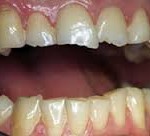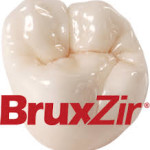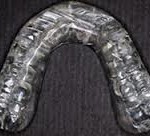Bruxism is often found in patients who clench or grind their teeth at night. Besides causing excessive wear on their teeth, bruxism also is a culprit of TMJ (temporo-mandibular joint) pain. In severe cases, a full-mouth reconstruction may be needed to restore the vertical dimension (the bite) before any forms (cosmetic aspect) being restored. In mild cases, a nightguard can be fabricated to prevent further damage. Bruxzir crowns are often prescribed for these patients because of their outstanding wear-resistance.
Sleep bruxism is considered a sleep-related movement disorder. People who clench or grind their teeth (brux) during sleep are more likely to have other sleep disorders, such as snoring and pauses in breathing (sleep apnea).
Because you may have sleep bruxism and be unaware of it until complications develop, it’s important to know the signs and symptoms of bruxism and to seek regular dental care.
Other tips to help you stop teeth grinding include:
-
Avoid or cut back on foods and drinks that contain caffeine, such as colas, chocolate, and coffee.
- Avoid alcohol. Grinding tends to intensify after alcohol consumption.
- Do not chew on pencils or pens or anything that is not food. Avoid chewing gum as it allows your jaw muscles to get more used to clenching and makes you more likely to grind your teeth.
- Train yourself not to clench or grind your teeth. If you notice that you clench or grind during the day, position the tip of your tongue between your teeth. This practice trains your jaw muscles to relax.
- Relax your jaw muscles at night by holding a warm washcloth against your cheek in front of your earlobe.


